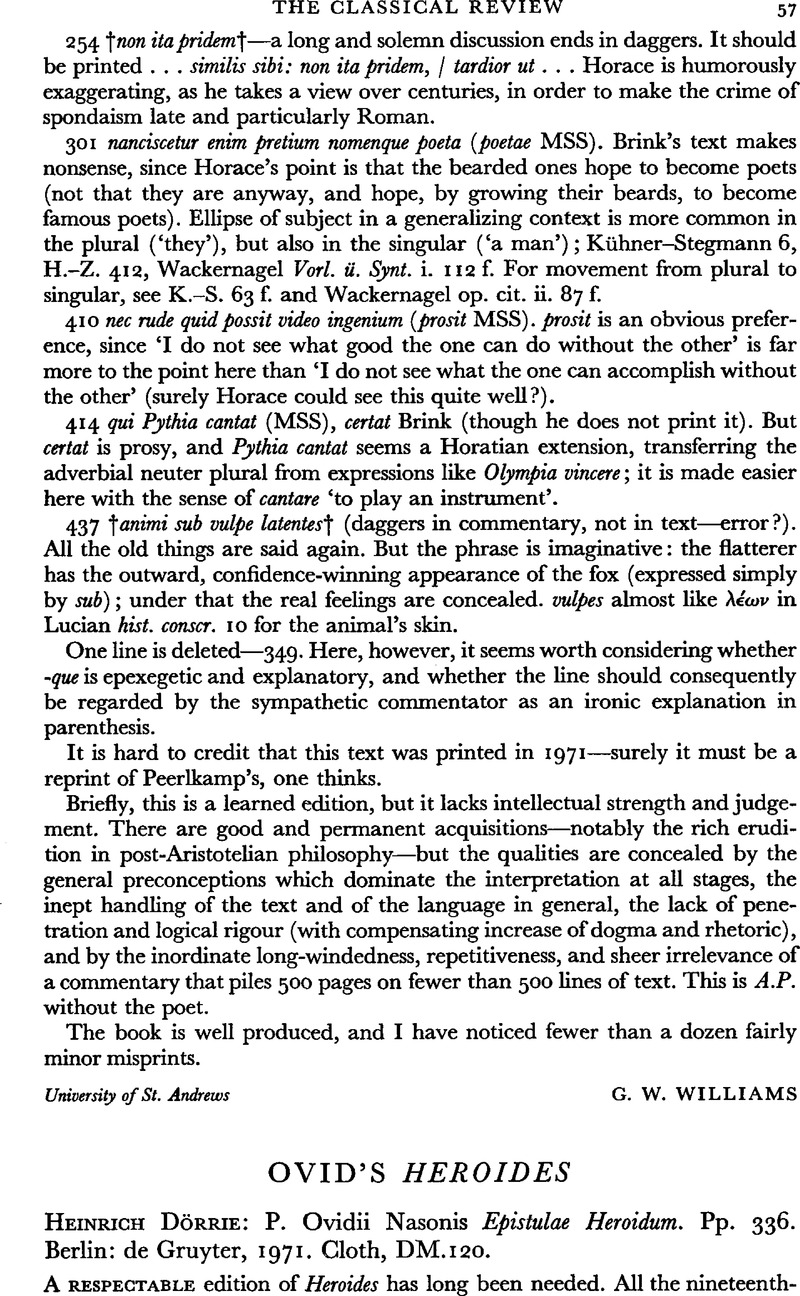No CrossRef data available.
Article contents
Ovid's Heroides - Heinrich Dörrie: P. Ovidii Nasonis Epistulae Heroidum. Pp. 336. Berlin: de Gruyter, 1971. Cloth, DM. 120.
Published online by Cambridge University Press: 27 February 2009
Abstract

- Type
- Reviews
- Information
- Copyright
- Copyright © The Classical Association 1974
References
page 59 note 1 Since carpere viam is a common phrase, this specious reading is too weak for the context.
page 59 note 2 Readings like this are more instructive than many divergences that are not obviously errors; ‘apparatus enim critici est non solum bonas lectiones suppeditare sed etiam pericula quae et qualia textui imminebant commemorare’ (Dörrie p. 296)—and, it should be added, singulorum codicum quam plenissime naturas exhibere.
page 59 note 3 One interesting fact about Ea that Dörrie had no space for is that when it offers introductory couplets missing from most of the manuscripts (Epp. 5, II, 20) both the first couplet and the second have their initial letter rubricated. In Ep. 20, moreover, lines 3–4 appear to have been written first and then erased to make way for lines 1–2.
page 59 note 4 This reading, whether inherited or conjectural, is surely right: it gives good sense, and worse things have happened to the text of Heroides than corruption of ipse to sed. Dörrie, incidentally, does not record P's omission of et.
page 59 note 5 This reading was printed by all editors before Merkel and is cited by Sedlmayer from ω. It has more to it than nostra.
page 60 note 1 Maia, xxii (1970), 7–8. Apologies are due to Dr. Diggle for the allegation of irresponsibility in his treatment of the evidence: PVa was a misprint for pVa.
page 60 note 2 The reviewer can say that Purser's report of Bentley's marginal notes is more accurate than Sedlmayer's but not as accurate as Hedicke's, E. in Studia Bentleiana, 5 (Freienwalde, 1905).Google Scholar
page 61 note 1 On 6. 93 Dörrie remarks that the word maga ‘non est Ovidiana‘ (for that matter it not even in the manuscripts), but elsewhere he is totally indifferent to Ovidian usage. Now that a Concordance is available, there is less excuse for such indifference than there was when Madvig at 6. 100 conjectured sese avet (a double offence) and Housman at 7. 85 sat me monuere, at 10. 31 haut dignam or haut umquam, at 16. 39 sic cum polleat arcus, at 20. 15 avemus idem, at 15. 41 sat iam formosa. Other offences of the same kind are 4. 9 quitur Birt, 7. 45 quidni cuncteris Ehwald, 7. 147 Thybridas undas Heinsius (see Palmer), 8. 34 pollet avus Bentley, 10. 112 haud semel Riese, 16. 223 quidni tamen edd. with W, 19. 11 lucta Heinsius.
In the main, Housman's conjectures in Heroides are nothing like as convincing as his later conjectures in the poems from exile or (C.Q. x [1916], 130–50). Besides the fault just mentioned, they suffer acutely from ‘the quackery which calls itself palaeographical emendation’ (ibid. 141).
page 62 note 1 An exception: at 20. 223 Dörrie mentions Dilthey's Carthaeis (taken from van Lennep), which had been rendered obsolete by Call. fr. 75.56 when Housman reviewed Bornecque's edition and in view of quondam was a bad conjecture anyway.
page 63 note 1 Unbeknown to Palmer, this was an idea of Bentley's.


